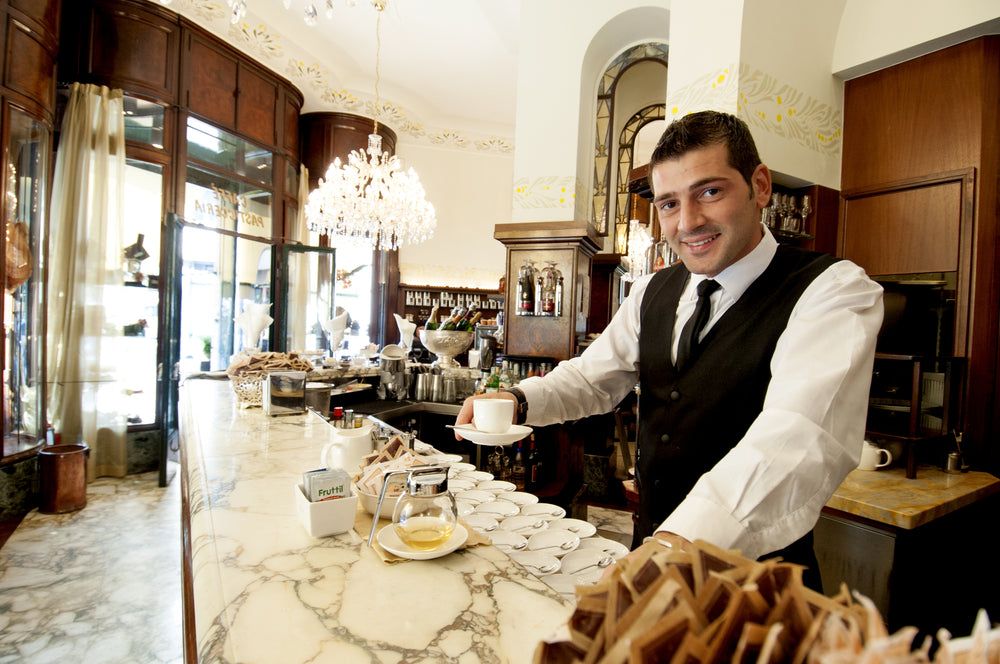Add description, images, menus and links to your mega menu
A column with no settings can be used as a spacer
Link to your collections, sales and even external links
Add up to five columns
Add description, images, menus and links to your mega menu
A column with no settings can be used as a spacer
Link to your collections, sales and even external links
Add up to five columns

The Rich History of the Espresso Bar
June 22, 2024 3 min read
The Rich History of the Espresso Bar
The Rich History of the Espresso Bar: From Italian Origins to Global Phenomenon
The espresso bar is more than just a place to get a quick caffeine fix; it's a cultural institution with a rich history that spans over a century. Originating in Italy, the espresso bar has become a global phenomenon, influencing coffee culture around the world. This comprehensive guide will take you through the fascinating journey of the espresso bar, highlighting its historical roots, evolution, and contemporary significance.
Origins of the Espresso Bar
Italy in the 19th Century
The story of the espresso bar begins in Italy in the late 19th century. The invention of the espresso machine by Angelo Moriondo in 1884 marked the dawn of a new era in coffee preparation. Moriondo's machine, patented in Turin, was designed to brew coffee faster than traditional methods, catering to the increasing demand for quick and efficient service in busy urban areas.
The Birth of the Espresso Bar Culture
Espresso bars started to emerge in Italian cities like Turin, Milan, and Rome. These establishments were not just places to drink coffee; they became social hubs where people could gather, converse, and enjoy the vibrant atmosphere. The espresso bar culture quickly spread, becoming an integral part of Italian life.
The Evolution Through the 20th Century
Early 1900s
In the early 20th century, the espresso machine underwent significant advancements. Luigi Bezzera and Desiderio Pavoni made crucial improvements, such as introducing the single-shot espresso machine, which allowed for faster and more consistent brewing. These innovations played a pivotal role in the proliferation of espresso bars across Italy.
Post-World War II
The post-World War II era saw a boom in espresso bar culture, thanks to the introduction of the Gaggia espresso machine in 1948. Invented by Achille Gaggia, this machine used a lever-operated system that produced a thicker and richer crema, enhancing the overall espresso experience. Espresso bars became more popular than ever, serving as essential social and cultural hubs in Italian cities.
Espresso Bars Around the World
Expansion to Europe
The appeal of espresso bars quickly spread beyond Italy's borders. In France, espresso bars became popular in cities like Paris, where they blended seamlessly with the local café culture. Similarly, in Spain, espresso bars emerged as integral parts of the social scene, particularly in urban areas.
The American Influence
The introduction of espresso bars to the United States marked a significant milestone in the global spread of espresso culture. In the mid-20th century, Italian immigrants brought their espresso-making traditions to American shores, leading to the establishment of espresso bars in cities like New York and San Francisco. The rise of major coffee chains like Starbucks in the 1980s and 1990s further popularized espresso-based drinks, making them a staple in American coffee culture.
The Modern Espresso Bar
Global Trends
Today, espresso bars can be found in virtually every corner of the world. The rise of specialty coffee and third-wave coffee culture has elevated the espresso bar experience, focusing on high-quality beans, precise brewing methods, and a deep appreciation for latte art and coffee making. This movement has brought a renewed interest in its origins and espresso drinks sparking a global appreciation for this classic beverage.
Cultural Impact
Espresso bars continue to serve as vital community spaces where people can gather, work, and socialize. The role of the barista has also evolved, with many becoming skilled artisans who play a crucial role in shaping coffee culture. The espresso bar remains a symbol of social connection and cultural exchange, reflecting the ever-changing landscape of global coffee trends.
Conclusion
The enduring popularity and cultural significance of espresso bars are a testament to their rich history and the timeless appeal of espresso. From their humble beginnings in Italy to their global influence today, espresso bars have left an indelible mark on coffee culture. As we look to the future, it's clear that the love for espresso and the espresso bar experience will continue to thrive, inspiring new generations of coffee enthusiasts around the world.
Espresso Coffee and 6 Espresso Coffee Drink Recipes
How to Make Espresso at Home—Part 2
Subscribe
Sign up to get the latest on sales, new releases and more …
